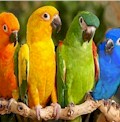One only needs to consider the past practices of how miners used canaries as a gauge for unhealthy air levels in the mines to sense how keen birds are to their surroundings. Should canaries expire while in the mines, it would alert the miners that the air was at an unhealthy level with abundant time for the miners to leave. While birds are sensitive creatures, they are also known to outlast some owners.
Just like birds found in the wild, pet birds are susceptible to unhealthy odors as well. Common household appliances and items such as Teflon pans, aerosol sprays and even innocuous furniture polish can be fatal for birds. One of the best practices when dealing with substances that may give off pungent odors is to use it in airy areas far away from your birds.
Pet birds have a natural inclination to chomp and it can be a major issue. When a bird chomps on soldered joints on welded items, lead poisoning is a common result. Also, birds do have a penchant to chew on potted plants. Despite popular sentiments, poinsettia plants are not deadly. It is important to remember that if you are unsure if a plant is toxic or not, it is best to err on the side of caution and move the plant away from the bird. A small pot of innocuous parsley can be helpful to the bird to overcome the desire of nibbling on houseplants as it is a safe substitute.
Fresh food that is fed to your birds will do them a whole lot of good; however, food like coffee, chocolate and avocado are fatal for birds and they should never be given such foods.
As the holiday season approaches, most people will bring a tree into their house. Many might think that a bird's natural habitat is a tree and have the belief that their birds will have an affinity for perching on it. It is true that birds might enjoy this exercise, many pine trees could have had preservatives or chemicals administered and prove fatal to your pet. Furthermore, electrical lights and decorations can be pose a certain kind of danger for your birds.
There are a number of precautionary issues to see to if your bird does not have had its wings clipped. Firstly, all glass doors and windows should be shielded one way or another. The best way to do this is with curtains or shades. An alternative to curtains or shades is placing safety decals on the glass so your birds can tell the glass is there and avoid serious injury or even death. You should treat other large reflective surfaces and mirrors in a similar manner when your pet bird is released from its cage.
Standing water can pose as a form of danger as well. The bird can meet its untimely end in a toilet bowl or full kitchen sink in a few seconds. If a bird is released from its cage, cooking with an uncovered pot is especially ill-advised.
Finally, always be mindful of the whereabouts of your bird even if its wings are clipped. On an updraft, even a bird with clipped wings can glide for quite some distance. It is easy to forget that your bird is perched on your shoulder when your doorbell suddenly rings and you rush to answer it but you must remember never to carry your bird to an open door regardless of whether or not its wings are clipped.
